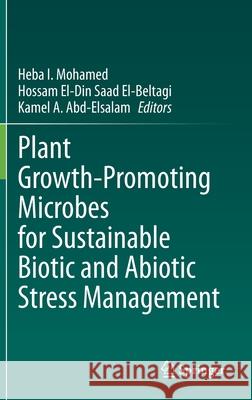Plant Growth-Promoting Microbes for Sustainable Biotic and Abiotic Stress Management » książka



Plant Growth-Promoting Microbes for Sustainable Biotic and Abiotic Stress Management
ISBN-13: 9783030665869 / Angielski / Twarda / 2021 / 672 str.
Plant Growth-Promoting Microbes for Sustainable Biotic and Abiotic Stress Management
ISBN-13: 9783030665869 / Angielski / Twarda / 2021 / 672 str.
(netto: 651,74 VAT: 5%)
Najniższa cena z 30 dni: 655,41
ok. 22 dni roboczych.
Darmowa dostawa!
Introduction
Chapter 1: Cyanobacteria and algae as biocontrol agents against fungal and bacterial plant pathogens
Chapter 2: Plant Growth Promoting Rhizobacteria in Amelioration of Abiotic Stresses: A Functional Interplay and Prospective
Chapter 3: Seaweeds as Indicators and Potential Remediators of Metal Pollution
Chapter 4: Role of microorganisms in managing soil fertility and plant nutrition in sustainable agriculture
Chapter 5: Role of Endophytic Bacteria in Alleviation of Heavy Metals from an ecosystem
Chapter 6: Microbial enzymes and soil healthChapter 7: Pseudomonas as Plant Growth Promoting Bacteria and Its Role in Alleviation Abiotic Stress
Chapter 8: Plant growth promoting Rhizobacteria (PGPR) as biocontrol agents against viral protection
Chapter 9: Potential Role of Endophytes in Weeds and Herbicide Tolerance in Plants
Chapter 10: The auspicious role of promoting plant growth of rhizobacteria in the sustainable management of plant diseases
Chapter 11: Microbial Bioactive Compounds Produced by Bacteria and Fungi and Uses in Plant Health
Chapter 12: Biosynthesis of Nanoparticles by Microorganisms and Applications in Plant Stress Control
Chapter 13: Nano-enabled Approaches for the Suitable Delivery of Fertilizer and Pesticide for Plant Growth
Chapter 14: Production of plant hormones from algae and its relation to plant growth
Chapter 15: Role of Trichoderma in agriculture and disease management
Chapter 16: Production of Antibiotics from Plant Growth Promoting Bacteria and their Role in Biocontrol of Plant Diseases
Chapter 17: Role of Phosphate-Solubilising Microorganisms in Agricultural Development
Chapter 18: Cyanobacteria as Biofertilizer and Its Effect under Biotic StressChapter 19: Microorganism: A potent biological tool to combat Insects and herbivores
Chapter 20: Eco-friendly approaches for the alleviation of root-knot nematodes
Chapter 21: Rhizosphere, Rhizosphere Biology and Rhizospheric EngineeringChapter 22: Microbial Enzymes and Role in Phytoremidation
Abiotic and biotic stress factors including drought, salinity, waterlog, temperature extremes, mineral nutrients, heavy metals, plant diseases, nematodes, viruses, and diseases, adversely affect growth as well as yield of crop plants worldwide. Plant growth promoting microorganisms (PGPM) are receiving increasing attention from agronomists and environmentalists as candidates to develop an effective, eco-friendly, and sustainable alternative to conventional agricultural (e.g., chemical fertilizers and pesticide) and remediation (e.g., chelators-enhanced phytoremediation) methods employed to deal with climate change-induced stresses. Recent studies have shown that plant growth promoting bacteria (PGPB), rhizobia, arbuscular mycorrhizal fungi (AMF), cyanobacteria have great potentials in the management of various agricultural and environmental problems.
Our intention for this book is to provide up-to-date knowledge of biofertilizer and the roles of microorganisms in plant health, with specific emphasis on the mitigating strategies to combat plant stresses.1997-2026 DolnySlask.com Agencja Internetowa
KrainaKsiazek.PL - Księgarnia Internetowa









